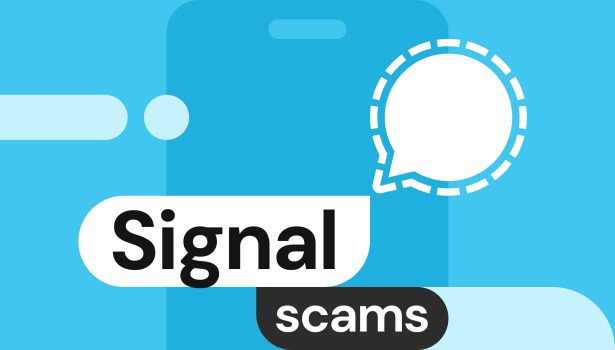Signal app scams: what you need to know

Signal is a well-known privacy-focused messenger app that first appeared in the US in 2014. Yes, that’s the one famously used by Trump administration officials. Yet, even though the app uses advanced security features such as end-to-end encryption and disappearing messages, it’s still not invincible when it comes to online scams.
While Signal itself is not a scamming app, Signal app scams are real and growing in both numbers and variety, with even digital-savvy and privacy-conscious people falling for them. Read on for a list of common Signal scams, their warning signs, and what you can do now to protect yourself.
Why Signal appeals to scammers
While Signal is generally safe to use and brings simplicity and privacy into day-to-day communication for its users, it’s also very much appealing to bad actors.
Signal might not be as attractive to scammers as WhatsApp because of its comparatively smaller user base—between 40 and 70 million monthly users, but there are still reasons scammers turn to it.
First, there’s anonymous registration that requires only a phone number. It simplifies sign-up but also makes it easier for impersonators to set up fake profiles of celebrities, public figures, and the like.
Then, there’s no algorithm flagging suspicious behavior. Because the app proudly doesn’t track or listen to its users’ conversations, it can’t detect when someone is being pushed into a scam trap or is about to click on a phishing link.
Finally, when the damage is done, it’s possible to report abuse to Signal, but the app doesn’t have any leverage to refund you if you’ve been scammed. Victims of Signal app scams have to turn to their banks or other authorities for legal and financial assistance, with no guaranteed outcome.
Common Signal messenger app scams
Do scammers use the Signal app? Yes, they do—just like they use other popular messengers such as WhatsApp or Facebook Messenger. With its anonymity and minimal identity verification, Signal is a fertile ground for impersonators, fake investment advisors, catfishers, and other fraudsters.
Here are the most common Signal messenger scams you should learn to recognize and avoid:
Signal support scams
Scammers often impersonate Signal’s technical support, targeting users with invented yet convincing scenarios of “suspicious account activity,” “verification issues,” “security alerts,” or “account suspension warnings.”
Their goal is to persuade you to drop your guard and share your account credentials or verification code with them, often via a phishing link to a spoofed website resembling signal.org but misspelled or altered. Once you do, they can use this information to hijack your account.
Remember that the legit Signal app support will never:
- Contact you through the app
- Ask for verification codes or PINs
- Send you links
If you have issues, reach out to the official Signal support through their website.
Romance scams
The Signal app is used for scamming by catfishers—people who lure users into online relationships only to ask for money. They will take time to develop a close connection with someone and then reach out for financial help due to an emergency, or ask to cover travel expenses to see that person. In reality, it’s a trick to gain trust and steal the victim’s money.
You can spot catfishing attempts when someone contacts you unexpectedly, perhaps claiming they messaged you by mistake, and starts a friendly or flirty conversation, avoiding video calls and playing hard to get. As disheartening as it may be, it’s best to avoid such contacts as they almost certainly are scammers.
Crypto investment scams
This scam may also start with an unexpected message sent “by mistake,” which quickly turns into the sender sharing their “investment success story” and inviting you to come along and invest to get some astonishing returns. They might promote a certain platform or simply ask to transfer money to a crypto wallet—and after the person submits, they disappear into thin air.
They often use crypto because the transactions are irreversible and the recipient’s identity is nearly impossible to trace. These scams are often combined with celebrity scams, where scammers create fake Signal accounts using a celebrity’s publicly available photo and impersonate them for added credibility.
Never trust strangers encouraging you to invest in shady schemes, even if they seem trustworthy. The anonymity of Signal makes it possible to impersonate just about anyone, and recovering lost investments is nearly impossible.
Celebrity scams
Celebrity scams on Signal involve impersonators of well-known people and organizations reaching out to random users for money, using fake profiles and exploiting celebrity status to build instant trust. These scams often start on other platforms like Instagram or YouTube and then migrate to Signal for more private communication.
Scammers use a range of scenarios—from “private fan connections” to fake crypto giveaways and impersonation of deceased celebrities’ estates—to introduce a believable reason for the victim to part with their money. This includes requests for donations, limited-time offers, fake cash rewards, or fundraising pleas.
If you’re ever contacted by a “celebrity” on Signal, pause and think. Never send money to someone you don’t know in real life. Check the celebrity’s official channels to verify the information, and reverse-search the profile image and the phone number online to see if it’s used elsewhere.
Impersonating known contacts
Among the broad variety of impersonation scams, this is perhaps the easiest to fall for, as scammers impersonate people you actually know. They can pull it off using publicly available photos and information to set up fake profiles, or by hacking your known contact’s Signal account and exploiting their contact list to extend the scam.
Using spoofed or stolen identities of trusted people, scammers reach out for help, claiming to be in an emergency or needing money as soon as possible because they’re “locked out” of a bank account, travelling, or have had their phone or wallet stolen.
If you get any suspicious messages from your known contacts, especially from a different phone number, pause and contact that person via a different channel to verify. Never act on impulse, as scammers want exactly that.
How to recognize a Signal app scam
As you can see, it’s much more effective to avoid Signal messaging app scams altogether than to try to mitigate the consequences. Even with a strong privacy-centered application like Signal, you still shouldn’t lower your guard.
Here’s a list of common red flags to watch out for:
- A stranger contacts you out of the blue, making financial or romantic offers.
- Someone you’re dealing with, such as a Facebook Marketplace scammer, urges you to move your communication off-platform to Signal.
- Requests for personal information: bank card details, national ID, SSN, Medicare number, crypto wallet keys, etc.
- Messages asking for your Signal sign-in verification code, even if they appear to come from Signal support.
- Prompts to click on a link disguised with a shortener or leading to an unknown website. Remember that the only official Signal domain is signal.org.
What to do if you encounter a scam on Signal
If you ever come across a scammer or fall victim to a Signal app scam, take the following steps:
- Stop communicating with the scammer immediately.
- Collect evidence, such as screenshots of the scammer’s name and messages.
- Report the scammer’s account to Signal (tap Report in the person’s profile card) so the app can identify and block it.
- Block the contact using the three-dot menu.
- Contact your bank or payment card issuer if you shared any financial information with the scammer.
- In the U.S., report the scam to the Federal Trade Commission. If you shared your Social Security number or suspect identity theft, report the scam to IdentityTheft.gov. Consider subscribing to an identity protection service for additional monitoring and support.
- If your Signal account was taken over, notify your contacts to prevent further impersonation.
What to do if you lost money in a Signal scam?
If you lost money in a Signal scam, there’s practically no way to get it back.
Signal can’t recover your lost funds, as it’s only a nonprofit messaging platform. It doesn’t process payments or offer any financial protection, since it’s not meant to handle transactions. As such, transactions happen via banks or payment providers, but their anti-scam protections are also limited for cases where users willingly gave money to scammers.
In certain jurisdictions, financial institutions are required to refund money lost in fraudulent (unauthorized) transactions, but each case is considered individually. Learn more:
- If you’re in the USA, check out the Consumer Financial Protection Bureau (CFPB).
- If you’re in the UK, check out Citizens Advice.
How to stay safe while using Signal
With barely any effective scam protection in place, staying safe on Signal depends on how well you embrace secure practices when using the app. Here’s a roundup of measures to apply to secure your Signal account and avoid being targeted by scammers.
Add extra security to your Signal account
By default, Signal supports two-step authentication by sending a verification code to your phone number when you register your account on a new device.
There’s a popular opinion that using an SMS pooling service helps to hide your real phone number during Signal registration and thus prevent scammers from reaching you. If you consider doing this, beware: it can expose you to the risk of losing access to this shared or recycled phone number and your Signal account being taken if Registration Lock is not enabled.
You can strengthen your Signal account security by enabling Registration Lock to prevent new registrations with your phone number on a new device without knowing your unique PIN.
It also helps to enable a secure Screen Lock on your device using your biometric data or a unique passcode to add another layer of protection on top of Signal’s built-in security controls.
Above all, never share your Signal verification code and PIN with anyone. Even Signal can’t reset or recover these security codes for their users.
Embrace smart user habits
You can secure your account, but scammers can still push through unless you stay vigilant Embrace these healthy and secure habits to curb scamming attempts:
- Block unknown contacts immediately unless their identity can be reliably verified.
- Don’t fall for offers that sound too good to be true, like investment or trading opportunities with sky-high returns.
- If someone poses as a person you know and asks for money or your help in any other way, verify their identity and the information separately via a different channel.
- If you spot any inconsistencies in language, urgency, or pressure to act as soon as possible, be cautious, as these are prime scamming tactics.
- Remove your phone number from public records, Google, and data broker websites using services like Onerep, which cleans your personal data from 200+ public websites and helps reduce its exposure to those who may misuse it.
FAQs
Is Signal a scammer app?
No, Signal is a legitimate messaging app. However, like any other messenger, it’s also popular with scammers who exploit its anonymity and broad user base to steal sensitive personal information and money.
Is the Signal app a scam?
The Signal app is a popular and safe messaging service used by millions of people around the world, yet there are many scams targeting Signal users that you should be aware of, including impersonation, crypto investment scams, fake celebrity scams, and romance and dating scams.
Is the Signal app safe to use?
Yes, Signal is generally safe to use for everyday communication with people you know and trust. The app uses end-to-end encryption, doesn’t store or track users’ messages, and supports disappearing messages for added privacy.
Can I get scammed on Signal?
Yes, you can get scammed on Signal, just like on any other messenger such as WhatsApp or Facebook Messenger. Stay vigilant and never share your personal information, bank card details, or Signal verification codes and PINs with strangers.





Dimitri is a tech entrepreneur and founder of Onerep, the first fully automated data removal service. Top cybersecurity CEO of 2021 by The Software Report.